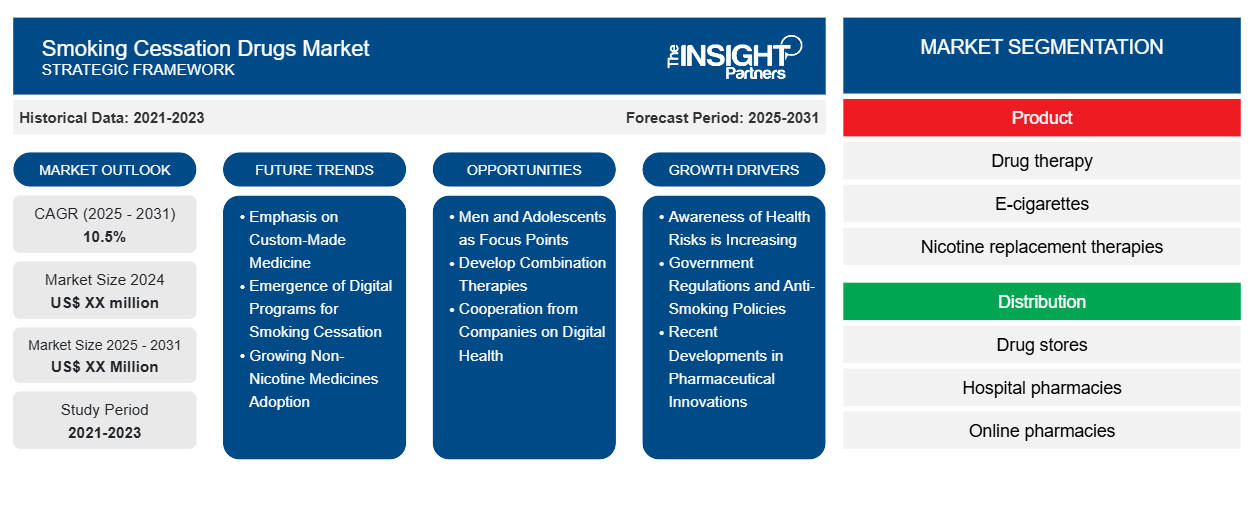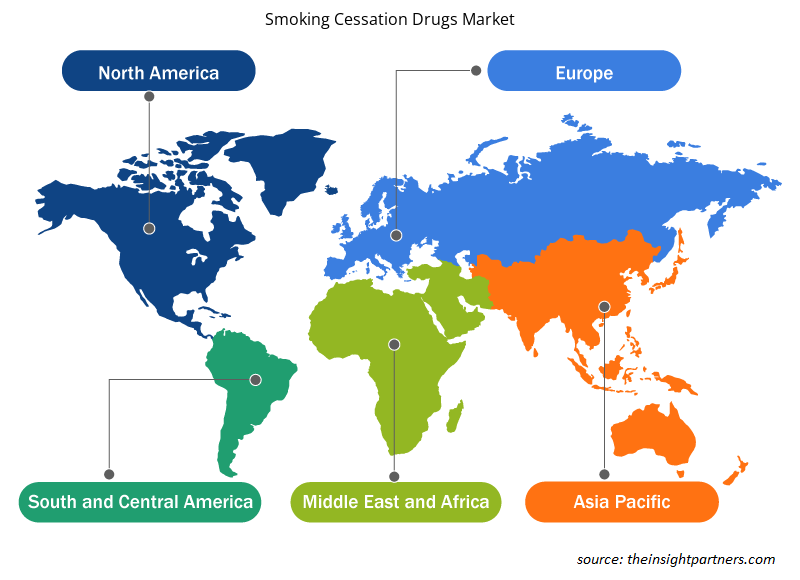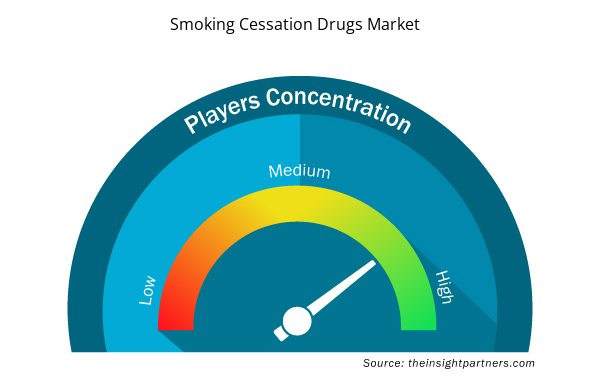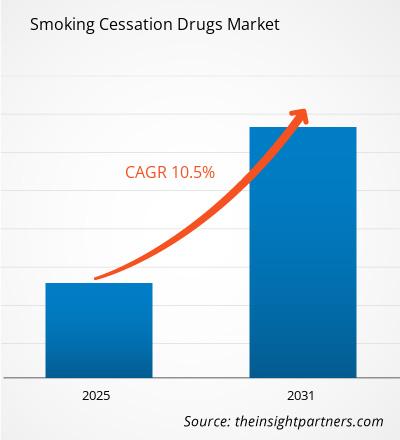The Smoking Cessation Drugs Market is expected to register a CAGR of 10.5% from 2025 to 2031, with a market size expanding from US$ XX million in 2024 to US$ XX Million by 2031.
The report is segmented by Product (Drug therapy, E-cigarettes, Nicotine replacement therapies, and Nicotine Sublingual tablets). The report is segmented by Distribution (Drug stores, Hospital pharmacies, Online pharmacies, and Retail pharmacies). The global analysis is further broken-down at regional level and major countries. The Report Offers the Value in USD for the above analysis and segments.
Purpose of the Report
The report Smoking Cessation Drugs Market by The Insight Partners aims to describe the present landscape and future growth, top driving factors, challenges, and opportunities. This will provide insights to various business stakeholders, such as:
- Technology Providers/Manufacturers: To understand the evolving market dynamics and know the potential growth opportunities, enabling them to make informed strategic decisions.
- Investors: To conduct a comprehensive trend analysis regarding the market growth rate, market financial projections, and opportunities that exist across the value chain.
- Regulatory bodies: To regulate policies and police activities in the market with the aim of minimizing abuse, preserving investor trust and confidence, and upholding the integrity and stability of the market.
Smoking Cessation Drugs Market Segmentation
Product
- Drug therapy
- E-cigarettes
- Nicotine replacement therapies
- Nicotine Sublingual tablets
Distribution
- Drug stores
- Hospital pharmacies
- Online pharmacies
- Retail pharmacies
Customize This Report To Suit Your Requirement
You will get customization on any report - free of charge - including parts of this report, or country-level analysis, Excel Data pack, as well as avail great offers and discounts for start-ups & universities
Smoking Cessation Drugs Market: Strategic Insights

- Get Top Key Market Trends of this report.This FREE sample will include data analysis, ranging from market trends to estimates and forecasts.
Smoking Cessation Drugs Market Growth Drivers
- Awareness of Health Risks is Increasing: It is primarily responsible for the emergence and growth prospects of the sector for the market smoking cessation drugs. Government agencies, health professionals, and advocacy groups have intensified the public awareness campaigns on the side effects of smoking, which include lung cancer, heart disease, and respiratory problems, as well as the most prominent smoking cessation products, as motivated smokers enlist products for quitting in safe and effective ways. Other measures such as public health campaigns and warnings on the packages have been and continue to capitalize more on the impact of anti-smoking laws.
- Government Regulations and Anti-Smoking Policies: All government have stringent regulations on smoking, coupled by higher taxes on the product, public smoking bans, and regulations with promotion of smoking cessation programs. The regulations are meant to discourage smoking; in addition, they push towards quitting doing so by helping a smoker avoid very easily temptation. Their emerging innovations include a variety of smoking cessation drugs, nicotine replacement therapies (NRTs), such prescription medications, and newer approaches that easily target the population.
- Recent Developments in Pharmaceutical Innovations: Continuous research and development have given birth to more effective and tailored treatment methods for patients who need using smoking cessation drugs. Some of these include varenicline (Chantix), bupropion (Zyban), as well as nicotine replacement therapies, which have been proven to reduce smoking and withdrawal effects. The current research effort is into the finalization of new drug delivery systems, such as e-cigarettes, transdermal patches, and oral tablets that provide smokers with options that are less obtrusive.
Smoking Cessation Drugs Market Future Trends
- Emphasis on Custom-Made Medicine: Personalized medicine now has an edge over most drugs in developed markets for smoking cessation. Apart from increased usage of genomics and pharmacogenomics, custom-made treatments address the lifestyle and smoking history of the patients, making them personalized for better chances at successful quitting. In addition to smoking, personalized medicine will be able to cater to common problems that accompany dependency, like anxiety and depression that reduce the efficacy of regular cessation methods.
- Emergence of Digital Programs for Smoking Cessation: Integrating smoking cessation schemes with digital technology is one of the most important trends in recent years. Mobile apps, virtual counseling, online support groups, and wearable devices that keep smoking habits and health parameters in check have brought about amazing changes in a smoker's access to the cessation wellness program. In addition, prices for digital solutions can be a lot more economical when compared to face-to-face therapy. They often allow continuous monitoring of intervention, which may be beneficial for a smoker to stay on the right track and receive timely intervention that could enhance the overall effectiveness of using these medications.
- Growing Non-Nicotine Medicines Adoption: NRTs have been the tried-and-true first-line treatment method for smoking cessation for many years. However, the trend has been moving away from increasing numbers of smokers ever willing to try non-nicotine drugs. Emerging into their popularity are varenicline and bupropion, both of which have actions in the central nervous system neurotransmitter systems in reducing craving and withdrawal symptoms. These medications are favored by some smokers because they do not contain nicotine, which perpetuates dependence.
Smoking Cessation Drugs Market Opportunities
- Men and Adolescents as Focus Points: Programs to quit smoking, specifically targeting women and adolescents, become an increasing space for opportunity. Because of the various barriers that women face such as weight gain and hormonal changes due to cessation, targeted treatment can be effective. Similarly, adolescents generally experience problems such as peer pressure and social acceptance that usually hinder them from quitting. It is about designing drugs for quitting that would be either convenient for these populations or about developing specifically targeted promotional campaigns that will address such particular needs.
- Develop Combination Therapies: It is also possible to develop combined therapy targeting various dimensions of smoking dependence, such as simultaneous treatment of both physical dependence and behavioral dependence through the use of their combination. That would help with long-term continuation of therapy. The combination of nicotine replacement and antidepressants or anti-anxiety drugs is another examples of combination therapies eliminating from the perspectives of dealing with the comprehensive nature of the phenomenon of dependence on smoking for their cessation.
- Cooperation from Companies on Digital Health: For tobacco cessation, digitalized health tools increasingly develop into a cure aspiration, and therefore pharmacy is standing up a unique opportunity to work with their counterparts in the digital health arena. These digital platforms will empower smoking cessation drug therapy inclusion in mobile applications and wearable devices to allow a more varied treatment option that incorporates behavior and medication into the therapy such that it maximizes engagement, optimizes adherence to treatment completion, and augments efficacy in quitting smoking.
Smoking Cessation Drugs Market Regional Insights
The regional trends and factors influencing the Smoking Cessation Drugs Market throughout the forecast period have been thoroughly explained by the analysts at Insight Partners. This section also discusses Smoking Cessation Drugs Market segments and geography across North America, Europe, Asia Pacific, Middle East and Africa, and South and Central America.

- Get the Regional Specific Data for Smoking Cessation Drugs Market
Smoking Cessation Drugs Market Report Scope
| Report Attribute | Details |
|---|---|
| Market size in 2024 | US$ XX million |
| Market Size by 2031 | US$ XX Million |
| Global CAGR (2025 - 2031) | 10.5% |
| Historical Data | 2021-2023 |
| Forecast period | 2025-2031 |
| Segments Covered |
By Product
|
| Regions and Countries Covered | North America
|
| Market leaders and key company profiles |
Smoking Cessation Drugs Market Players Density: Understanding Its Impact on Business Dynamics
The Smoking Cessation Drugs Market market is growing rapidly, driven by increasing end-user demand due to factors such as evolving consumer preferences, technological advancements, and greater awareness of the product's benefits. As demand rises, businesses are expanding their offerings, innovating to meet consumer needs, and capitalizing on emerging trends, which further fuels market growth.
Market players density refers to the distribution of firms or companies operating within a particular market or industry. It indicates how many competitors (market players) are present in a given market space relative to its size or total market value.
Major Companies operating in the Smoking Cessation Drugs Market are:
- British American Tobacco PLC
- Dr. Reddy's Laboratories
- Fontem Ventures
- GlaxoSmithKline
- GSK
Disclaimer: The companies listed above are not ranked in any particular order.

- Get the Smoking Cessation Drugs Market top key players overview
Key Selling Points
- Comprehensive Coverage: The report comprehensively covers the analysis of products, services, types, and end users of the Smoking Cessation Drugs Market, providing a holistic landscape.
- Expert Analysis: The report is compiled based on the in-depth understanding of industry experts and analysts.
- Up-to-date Information: The report assures business relevance due to its coverage of recent information and data trends.
- Customization Options: This report can be customized to cater to specific client requirements and suit the business strategies aptly.
The research report on the Smoking Cessation Drugs Market can, therefore, help spearhead the trail of decoding and understanding the industry scenario and growth prospects. Although there can be a few valid concerns, the overall benefits of this report tend to outweigh the disadvantages.
- Historical Analysis (2 Years), Base Year, Forecast (7 Years) with CAGR
- PEST and SWOT Analysis
- Market Size Value / Volume - Global, Regional, Country
- Industry and Competitive Landscape
- Excel Dataset



Report Coverage
Revenue forecast, Company Analysis, Industry landscape, Growth factors, and Trends

Segment Covered
This text is related
to segments covered.

Regional Scope
North America, Europe, Asia Pacific, Middle East & Africa, South & Central America

Country Scope
This text is related
to country scope.
Frequently Asked Questions
The Smoking Cessation Drugs Market is estimated to witness a CAGR of 10.5% from 2023 to 2031
The major factors driving the Smoking Cessation Drugs market are:
1. Awareness of Health Risks is Increasing
2. Government Regulations and Anti-Smoking Policies
Men and Adolescents as Focus Points act as a opportunity for growth of the market in forecast period.
North America region dominated the Smoking Cessation Drugs market in 2023.
Players operating in the market are British American Tobacco PLC, Dr. Reddy's Laboratories, Fontem Ventures, GlaxoSmithKline, Imperial Tobacco, Johnson & Johnson, Kimree Technology, Nicotek LLC
Nicotine replacement therapies segment, by product, dominated the market in 2023.
Trends and growth analysis reports related to Life Sciences : READ MORE..
1. British American Tobacco PLC
2. Dr. Reddy's Laboratories
3. Fontem Ventures
4. GlaxoSmithKline
5. GSK
6. Imperial Tobacco
7. Johnson & Johnson
8. Kimree Technology
9. Nicotek LLC
10. Njoy Inc.

 Get Free Sample For
Get Free Sample For